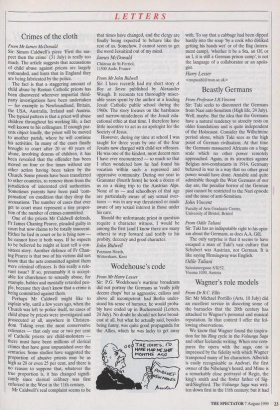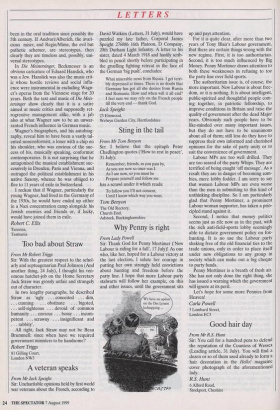Wagner's role models
From Dr B.C. Ellis Sir: Mr Michael Portillo (Arts, 10 July) did an excellent service in dissecting some of the barnacles that the 20th century has attached to Wagner's personal and musical reputation. In that context I offer the fol- lowing observations.
We know that Wagner found the inspira- tion for his Ring cycle in the Volsunga Saga and other Icelandic writing. When one com- pares the opera with the saga, one is impressed by the fidelity with which Wagner transposed many of his characters. Alberich is easily recognisable as Andvari, the first owner of the Nibelung's hoard, and Mime is a remarkably close portrayal of Regin, the king's smith and the foster father of Sig- urd/Siegfried. The Volsunga Saga was writ- ten down first in the 1.1th century; but it had
LETTERS
been in the oral tradition since possibly the 5th century. If Andvari/Alberich, the avari- cious miser, and Regin/Mime, the evil but pathetic schemer, are stereotypes, then clearly they are timeless and, possibly, uni- versal stereotypes.
In Die Meistersinger, Beckmesser is an obvious caricature of Eduard Hanslick, who was a Jew. Hanslick was also the music crit- ic whose hostile reviews and social influ- ence were instrumental in excluding Wagn- er's operas from the Viennese stage for 20 years. Both the text and music of Die Meis- tersinger show clearly that it is a satire aimed at music critics and supposedly ret- rogressive management alike, with a jab also at what Wagner saw to be an unwar- ranted French influence in German music.
Wagner's biographers, and his autobiog- raphy, reveal him to have been a vastly tal- ented nonconformist, a loner with a chip on his shoulder, who was envious of the suc- cess of his, musically speaking, conformist contemporaries. It is not surprising that he antagonised the musical establishment suc- cessively in Dresden, Paris and Vienna, and outraged the political establishment in his native Saxony, whence he was obliged to flee to 11 years of exile in Switzerland.
I reckon that if Wagner, particularly the young Wagner, had lived in the Germany of the 1930s, he would have ended up either in a Nazi concentration camp alongside his Jewish enemies and friends or, if lucky, would have joined them in exile.
Robert C. Ellis
Taroona, Tasmania



























































 Previous page
Previous page